July: The ‘Decisive Offensive’ that seals the Provisional Government’s fate
This month is marked by events that arguably cost the Provisional Government the last ounce of popular trust it still enjoyed. The much-delayed ‘Kerensky offensive’ starts off well, but quickly spins out of control catastrophically due to low troop morale and desertions – the foundations for which were laid with the ultra-liberal Order no.1. Despite General Kornilov’s brilliant command, by mid-July it becomes clear that the momentum has been lost: the shock troops suffer heavy losses, and the rear refuses to do battle.
In Petrograd, mass anti-government demonstrations of soldiers and ordinary civilians erupt in violence. This further upsets the flimsy balance of popular trust in favor of the Bolsheviks. Vladimir Lenin’s presence is becoming a real nuisance, and the government does its utmost to paint low frontline morale and chaos at home as a result of his propaganda and supposedly cozy relationship with Russian enemies Prussia and Austria-Hungary. In the third week, warrants are issued for the arrest of Bolshevik top command, including Lenin. They are labeled German agents, sent back to ruin Russia with their radical brand of leftism. No evidence of this will ever be uncovered by the authorities. The month of July will culminate in the collapse of the south-western front and yet another government crisis – this time with the Bolsheviks, Mensheviks, Anarchists and the SRs all seizing upon growing popular discontent to further alienate Kerensky and the Provisional Government.
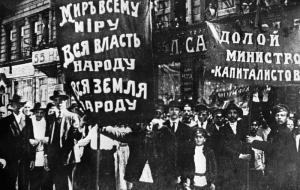
July 4, 1917
An official ceremony is held in Petrograd for the induction into the armed forces of the first Women’s Battalion of Death. This unenviable role is eagerly taken up by women of all walks of life – bourgeoisie and working class. The majority, however, come out of the former female battalions of the Russian Empire’s Army. More than 3,000 women are drafted.
The death squad is the brainchild of the now-legendary Maria Bochkareva – a decorated officer of the Russian Army and a hero of the World War. For Bochkareva, the war was an exit from a life filled with immense hardship. Since 1914, she had risen to the rank of non-commissioned officer, petitioning the government to establish the first battalion. The minister of war, Alexander Kerensky, saw this as an opportune development, as he riled up the nation to fight in his June Offensive (July 1), also known as the Kerensky Offensive.
Bochkareva’s unit was the first ever professional fighting force made up exclusively of women. So strict was her regiment – including forbidding the formation of soldiers’ committees – that many were simply driven out, with only about 300 volunteers remaining.
These women would go on to do things that forever changed the outlook on what women could do: during Kerensky’s offensive, Bochkareva’s unit was assigned to the 525th Kiuruk-Darinski Regiment, holed up in a trench in Belarus. At one point an order was given to go up top and attack. The men hesitated, but Bochkareva’s women decided not to wait and, amazingly, pushed through into German territory. Her battalion’s courage and tenacity was commended in a report, but unfortunately the ground they had fought so hard to gain would be lost, as reinforcements did not arrive on time.
The female troops will later play a key role in defending Kerensky’s government during the October siege of his government by Lenin’s Bolsheviks.
By 1918, the death squad would be disbanded, thanks in no small part to male hostility in the army. Many women, however, would continue to serve past that in varying capacities.
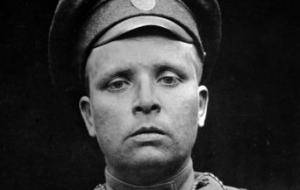
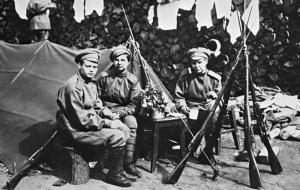
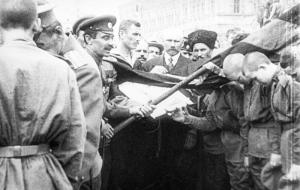
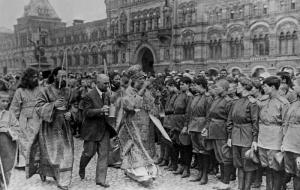
July 6, 1917
The Russian Army makes another pass at Lvov, Ukraine, together with much-needed reinforcements to secure gains. The attacks on enemy lines resume, but are rather lackluster, and do not yield further progress.
There is a lot of in-fighting and discussions as to what do next, as weak discipline cripples a concerted effort. Only General Kornilov’s army makes some headway near Ivano-Frankovsk, while the rest are in their third day of being stuck outside Lvov.
Meanwhile, the Arabs of the Arabian Peninsula manage to wrestle away the port of Aqaba from the Turkish.
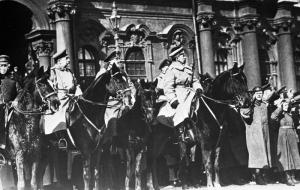
July 9, 1917
Nicholas II and his family, still under house arrest, opt to sign up for the Provisional Government’s Freedom Loans, equaling 500,000 rubles. These loans represent one of the key economic reforms of the time, the brainchild of Finance Minister Mikhail Tereschenko. The loans are distributed by the State Bank, in concert with other, private banks, and are payable over a period of 49 years at 85 percent of a 100-ruble bond – or 85 rubles.
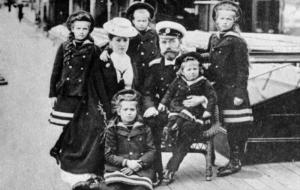
July 10, 1917
Kiev command issues an order to the soldiers to congratulate those who have left to fight, but cautioning against disciplinary transgressions and chaos among the ranks, including turning to criminal activity.
July 13, 1917
Having carried out a successful attack in the vicinity of Galich on July 6, the Russian forces are extremely effective in not leaving the Germans enough time to pull back. As a result the Russians capture more than 7,000 POWs. By July 13, the city falls to the 8th Army, headed by General Kornilov, also taking Kalush in the process.
However, his soldiers also stop there, as the passive nature of the 7th and 11th armies put the entire side of the 8th Army at risk, preventing it from proceeding further. In the 12 days since July 6, however, Kornilov will capture a total of 36,000 prisoners. This will force the German command to ferry to the southwestern front more troops from the western front.
July 20, 1917
A declaration is issued by the Provisional Government proposing to make Russia a republic, to call a Constituent Assembly and develop land, food and labor reforms. This leads to the current head of the Provisional Government, Prince Lvov, resigning in protest. There are unconfirmed reports that Minister of War Alexander Kerensky is to replace him, while retaining his current position.
The British government expresses hope that Kerensky will continue to fulfill Russia’s obligations to its war allies. Kerensky continues to deal with desertion and loss of morale on the battlefield by promising harsh punishment – which will eventually lead to orders for deserters to be shot, as Russia begins to give up conquered territories, and the German side advances. Arrests of Russian commanders are also being carried out.
The government tries to deal with Bolshevism at home by spreading rumors that Vladimir Lenin is a German agent, as the Bolsheviks are now a crucial influence on the population of Petrograd, as well as the frontline troops.
July 21, 1917
Kerensky is officially announced as prime minister. His first order of business is to form a new coalition government.
Arrest warrants are issued for Bolshevik leaders, as well as allies. Nobody believes it will be a fair trial, with the Provisional Government being referred to as a military dictatorship.
General Lavr Kornilov is appointed commander of the South-Western Front, taking over amid the severe conditions caused by an enemy counteroffensive. The Germans make massive strides to the point that they don’t have enough logistical capabilities to hold the territories captured from the Russians. Kornilov urges the introduction of the death sentence for desertion.
The Germans take 6,000 POWs and capture 70 artillery systems near Ternopil. But the Russian side also enjoys some success on the Western Front, as German trenches succumb to a three-day artillery preparation. The Russians capture their first German line that day.
Meanwhile, Ukrainian nationalists agree to deploy to the front. However, over in Belarus, Minsk, nationalists organize their own Rada, demanding land reforms and autonomy from Russia.
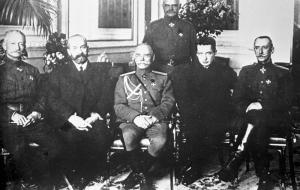
July 24, 1917
Suspected spy and exotic dancer Mata Hari is on trial in Paris. She aroused suspicion due to her frequent travel between France and her native Netherlands, as well as the number of her high-profile lovers – many of them politicians. She is said to have been working for several intelligence services in the period during the war, including both France and Germany. The French government was surprised to find out that, after sending her off on an assignment to Germany in 1916, she had been working for the Germans – the country thought to be the first to recruit her in such a capacity. She was arrested upon returning to France and charged with spying. Mata Hari (real name Margaretha Geertruida Zelle) will face the firing squad in October of 1917.
July 25, 1917
With discipline and morale at an all-time low, the Provisional Government steps up its game against mutineers and deserters. A revolutionary court-martial has been put in place, and the death penalty has also been brought back for particularly aggravated acts of desertion, constituting treason. Other harsh punishments were also threatened on any fleeing soldier engaging in acts of violence or other crimes toward the civilian population.
Meanwhile the Austro-German forces also manage to retake the city of Ternopol, in Glacia.
-
1 July
-
4 July
-
6 July
-
9 July
-
10 July
-
13 July
-
20 July
-
21 July
-
24 July
-
25 July